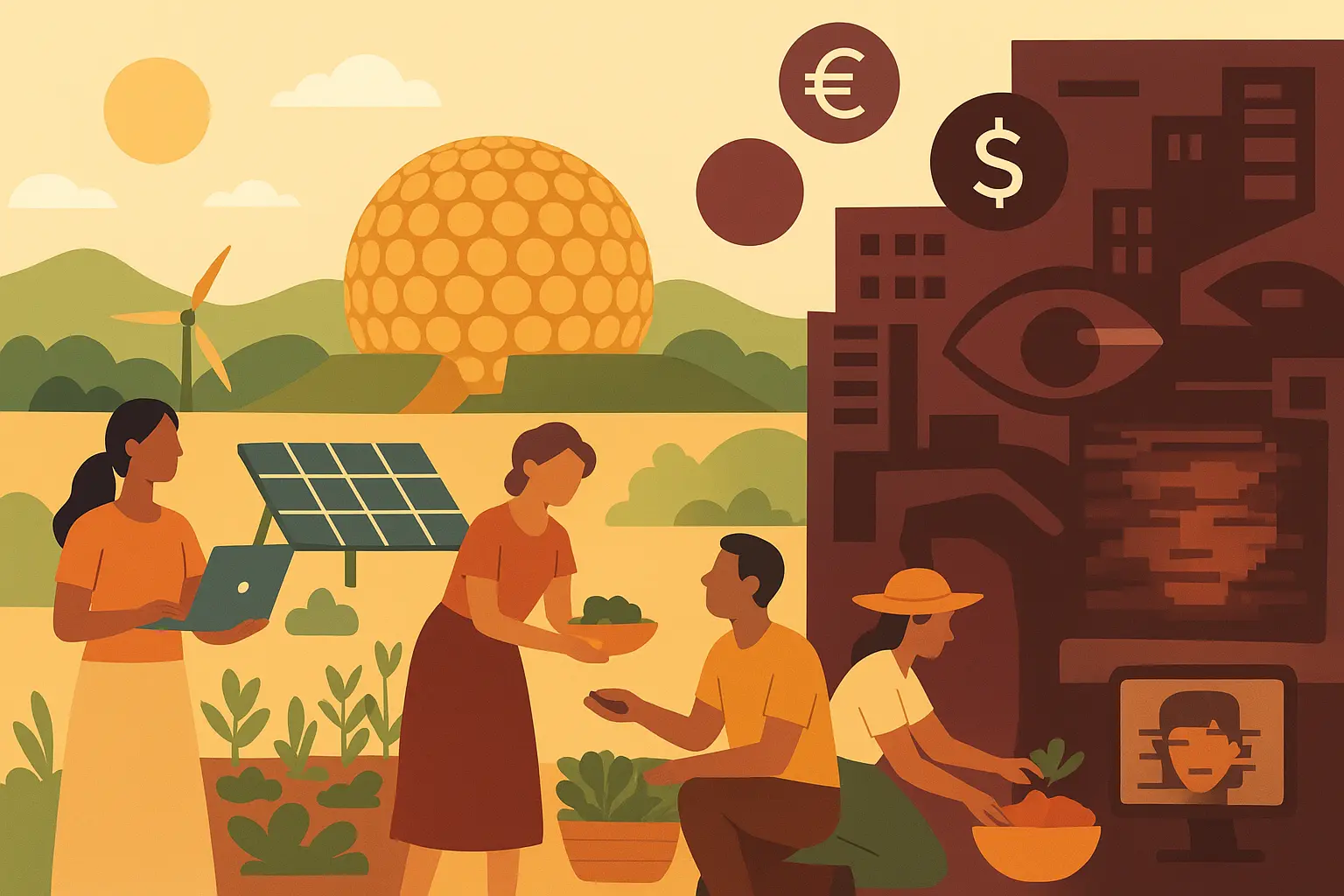Beyond Money: The Auroville Experiment
by Kirtana Krishna
5 min read • October 05, 2025

A lot of people are now aware of this experiment in human society called Auroville, and many more are curious about it. As someone who runs a small bed and breakfast on the “fringe” of Auroville (more bed, less breakfast), the most common question I get is: How does it work exactly? How do they make money? Do they make money at all?
Most visitors struggle to wrap their heads around Auroville’s economics. How can a community function without money? But that’s the misunderstanding. Money is very much a part of daily life here—it’s just not treated as the ultimate goal. It’s a tool, a means to an end. And that end, at least in theory, is something deeper: the spiritual growth and inner development of each resident.
In this light, Auroville’s structures are designed for collective benefit. The solar kitchen, for example, still provides meals for residents today. And no, you don’t have to pay for it. At its founding, Auroville explicitly rejected the capitalist ideas of private property and wealth accumulation. Land and infrastructure are held by the Auroville Foundation, ensuring that no individual can own property here (Auroville Foundation Act, 1988). Instead, resources are treated as commons, shared and stewarded by everyone.
And here’s something that surprises many: the internal economy is largely cashless. Residents receive a monthly “maintenance” allowance, covering basic needs like food, housing, and healthcare, funded by collective contributions (Kapoor, 2011). People are expected to contribute their work as a service to the community, rather than as wage labour in the usual sense. Commercial units, from bakeries to construction collectives, operate on self-sufficiency and reinvest profits into the community rather than private hands (Heehs, 2012). That may not sound like much, but when your home is provided, your meals are covered, and community hours form a major part of your purpose in life and when you’ve bought into the idea that the inner is greater than the outer, what else is there to want?
Of course, it’s not all idyllic. Despite its ideals, Auroville’s economy faces real challenges. The first is its dependence on external markets. Though it tries to be self-sufficient, Auroville relies heavily on imports from Tamil Nadu and beyond, food, building materials, everyday goods (Gupta, 2015). Commercial units often engage with global markets to remain viable, exporting handicrafts, textiles, and renewable energy products (Narayan, 2019). This opens them up to the very capitalist forces they seek to resist.
Another challenge is inequality within the township itself. While maintenance covers essentials, disparities exist between those with outside income and those fully reliant on community funds (Kapoor, 2011). These differences create subtle hierarchies that undermine the principle of equality.
There’s also tension with nearby Tamil villages. Many locals depend on wage labour in farms, guesthouses, and construction projects but don’t participate fully in Auroville’s cashless economy. This creates misunderstandings, with some perceiving Auroville as exclusionary or elitist, even as they benefit from its spillovers (Narayan, 2019).
There are also legal and bureaucratic hurdles that complicate its autonomy. Auroville must navigate state regulations, taxes, and foreign funding rules. India’s tightening norms on foreign contributions affect its ability to receive global donations, which is a vital support system for the town(Chopra, 2021).
Finally, there’s the cultural weight of capitalism. New residents, especially from abroad, often struggle to adapt to a contribution-based system, bringing expectations shaped by conventional monetary exchange. Meanwhile, global consumer culture, through digital media, tourism, and market trends, exert constant pressure, making it harder to sustain simplicity and collective responsibility (Gupta, 2015).
What Does This Mean?
Auroville’s experiment offers a fascinating glimpse into how an alternative economy could function. It shows that commons-based governance is possible, sustaining over 3,000 permanent and up to 10,000 transient residents for more than five decades. Its achievements in renewable energy, ecological restoration, and cooperative living are a testament to what’s possible when communities prioritise shared well-being over profit (Heehs, 2012).
At the same time, its struggles reveal the limits of such experiments in a globalised world. Without larger systemic change, enclaves like Auroville risk being pulled into the very market forces they challenge. Their balancing act, between idealism and pragmatism, autonomy and market dependence is a story being written across many post-capitalist initiatives.
Takeaways
Auroville’s ‘cashless’ and contribution-based economy remains a bold effort to rethink the relationship between money, work, and community. It invites us to question whether human societies need to revolve around accumulation and wealth, and whether cooperation, trust, and shared purpose can be enough. Its challenges, dependency on external markets, inequalities, tensions with surrounding communities, and state oversight remind us that sustaining such a system in today’s world is no easy feat. And yet, by continuing the experiment, Auroville offers something invaluable: a space where economic imagination and spiritual aspiration meet, reminding us that societies can organise themselves around values beyond profit.
About the Author
Kirtana Krishna is a musician, songwriter, and curator based near Auroville, India. She is the frontwoman of Sage for the Ages, a band known for its eclectic compositions that traverse the lyrical spectrum from the metaphysical to the political. A longtime vocal coach, Kirtana has spent years helping others find their voice — both musically and personally. She is also the owner of Dorian House, an Airbnb and event space that has evolved into a creative hub for musicians, travelers, and thinkers. In Chennai, she curates jazz-forward events, nurturing a growing community for improvisational and contemporary music. Deeply passionate about environmental and social causes, Kirtana believes in the power of activism through music — using art as a means to question, connect, and create real societal change. When she isn’t performing or curating, she can often be found surrounded by her dogs and the sounds of the forest.